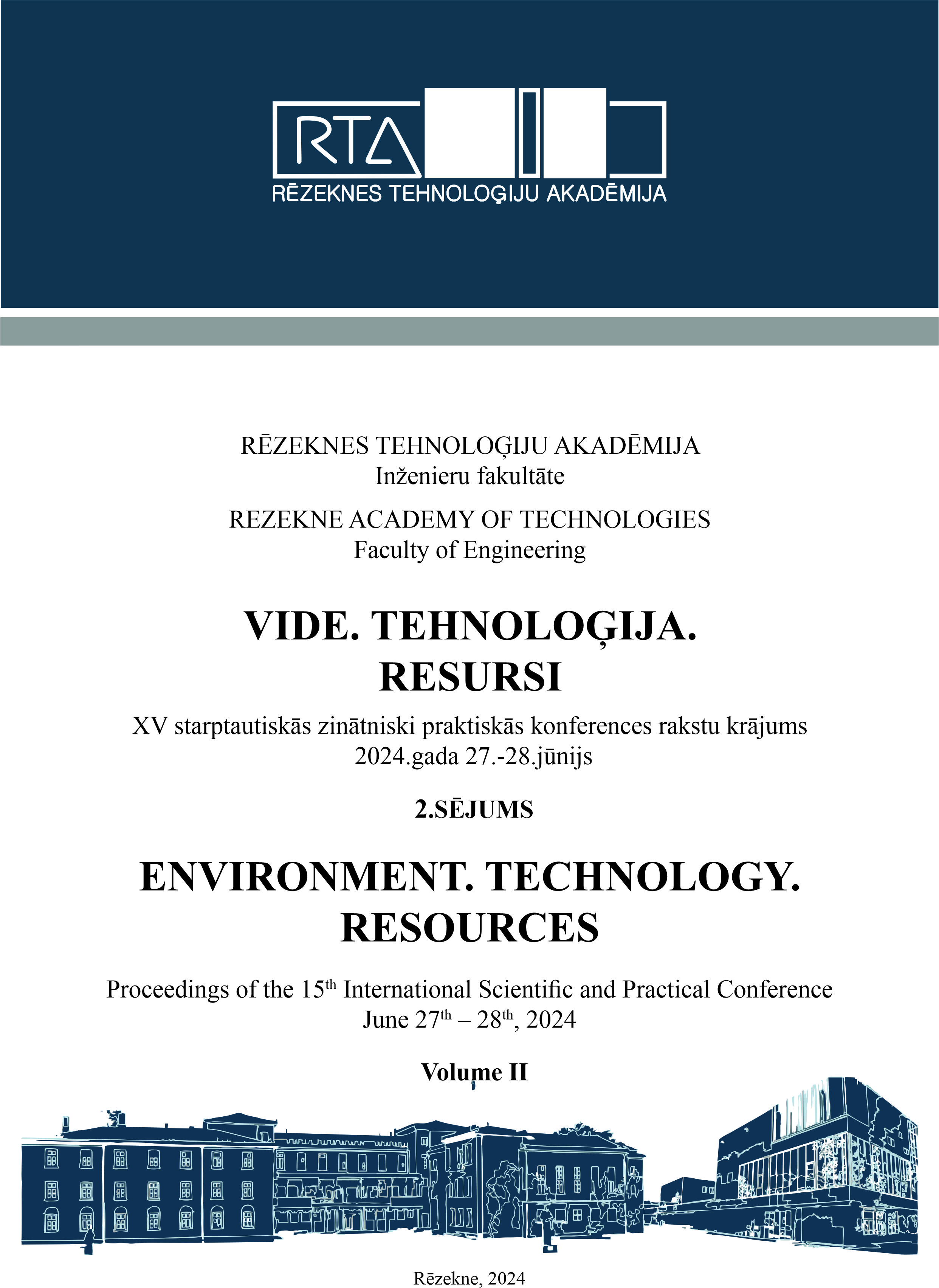PROS AND CONS OF USING ALGORITHMIC MANAGEMENT IN HUMAN RESOURCE
DOI:
https://doi.org/10.17770/etr2024vol2.8031Keywords:
Algorithmic management, Artificial Intelligence, Human Resource Management, ICT companiesAbstract
The opportunities that Artificial Intelligence and the principles of Algorithmic management provide to modern managers bring undeniable advantages for the development of a competitive business in today's extremely difficult business environment. At the same time, however, the effect of their use should be carefully analysed from the point of view of the compliance of the employees opinion in the enterprise - mainly in line with the observance and guarantee of basic rights of the employees. In this regard, the European Parliament and the European Council launched a legislative initiative to define harmonized rules within the Community on the use of artificial intelligence. Concepts such as "algorithmic discrimination" were introduced quite purposefully at the regulation level, given the risk of possible abuses associated with the use of AI. This report aims to ascertain the views of employers and employees on the use of artificial intelligence in Human Resource Management. The report presents and analyses data from an empirical study conducted among managers and employees in leading ICT enterprises in Bulgaria. According to our responders, one of the biggest advantages of using AI in Human Resources Management is related to the elimination of subjectivity in performance evaluation and the possibility of fair play in the procedures of internal selection of employees. At the same time, employees with more experience (over 10 years) are more sceptical of the idea of their work performance being evaluated solely by AI, while younger workers show more trust in AI solutions. However, both managers and workers recognize that it is best for the final decision in determining career development to be made by a person, but justified by the analyses made by AI. The report draws conclusions and recommendations that can serve both researchers and business managers. Certainly, AI is yet to undergo a very large development and application, including in the Human Resource Management, but at the same time it should not be at the expense of affected rights.
References
Y. Zhou, L. Wang and W. Chen, The dark side of AI-enabled HRM on employees based on AI algorithmic features, Journal of Organizational Change Management, Volume 36, Issue 7, 2023, Pages 1222-1241, ISSN 0953-4814, https://doi.org/10.1108/JOCM-10-2022-0308.
M. Langer and C. J. König, Introducing a multi-stakeholder perspective on opacity, transparency and strategies to reduce opacity in algorithm-based human resource management, Human Resource Management Review, Volume 33, Issue 1, 2023, 100881, ISSN 1053-4822, https://doi.org/10.1016/j.hrmr.2021.100881.
S. K. Ötting and G. W. Maier, The importance of procedural justice in Human–Machine Interactions: Intelligent systems as new decision agents in organizations, Computers in Human Behavior, Volume 89, 2018, Pages 27-39, ISSN 0747-5632, https://doi.org/10.1016/j.chb.2018.07.022.
A. Lukács and S. Váradi, GDPR-compliant AI-based automated decision-making in the world of work, Computer Law & Security Review, Volume 50, 2023, 105848, ISSN 0267-3649, https://doi.org/10.1016/j.clsr.2023.105848.
L. Manroop, A. Malik and M. Milner, The ethical implications of big data in human resource management, Human Resource Management Review, 2024, 101012, ISSN 1053-4822, https://doi.org/10.1016/j.hrmr.2024.101012.
P. Andrieux, R. D. Johnson, J. Sarabadani, and C. V. Slyke, Ethical considerations of generative AI-enabled human resource management, Organizational Dynamics, 2024, 101032, ISSN 0090-2616, https://doi.org/10.1016/j.orgdyn.2024.101032.
K. M. Lukaszewski and D. L. Stone, Will the use of AI in human resources create a digital Frankenstein?, Organizational Dynamics, 2024, 101033, ISSN 0090-2616, https://doi.org/10.1016/j.orgdyn.2024.101033.
M. L. Bartosiak and A. Modlinski, Fired by an algorithm? Exploration of conformism with biased intelligent decision support systems in the context of workplace discipline, Career Development International, Volume 27, Issue 67, 2022, Pages 601-615, ISSN 1362-0436, https://doi.org/10.1108/CDI-06-2022-0170.
H. Kong, Z. Yin, Y. Baruch and Y. Yuan, The impact of trust in AI on career sustainability: The role of employee–AI collaboration and protean career orientation, Journal of Vocational Behavior, Volume 146, 2023, 103928, ISSN 0001-8791, https://doi.org/10.1016/j.jvb.2023.103928.
W. Gryncewicz, R.Zygała and A.Pilch, AI in HRM: case study analysis. Preliminary research, Procedia Computer Science, Volume 225, 2023, Pages 2351-2360, ISSN 1877-0509, https://doi.org/10.1016/j.procs.2023.10.226.
G. Dimcheva and I. Stoyanov, "Challenges to the Application and Decision-Making using Artificial Intelligence (AI): Analysis of the Attitudes of Managers in Bulgarian Service Companies," 2023 4th International Conference on Communications, Information, Electronic and Energy Systems (CIEES), Plovdiv, Bulgaria, 2023, pp. 1-5, doi: 10.1109/CIEES58940.2023.10378811.
H. Aguinis, J. R. Beltran and A.Cope, How to use generative AI as a human resource management assistant, Organizational Dynamics, 2024, 101029, ISSN 0090-2616, https://doi.org/10.1016/j.orgdyn.2024.101029.
J. H. Marler, Artificial intelligence, algorithms, and compensation strategy: Challenges and opportunities, Organizational Dynamics, 2024, 101039, ISSN 0090-2616, https://doi.org/10.1016/j.orgdyn.2024.101039.
X. Parent-Rocheleau and S. K. Parker, Algorithms as work designers: How algorithmic management influences the design of jobs, Human Resource Management Review, Volume 32, Issue 3, 2022, 100838, ISSN 1053-4822, https://doi.org/10.1016/j.hrmr.2021.100838.
M. Mancheva and S. Stamatev, Trends and Impacts of Minimum Wage in Bulgaria after 1999, Ikonomiceski i Sotsialni Alternativi, University of National and World Economy, Sofia, Bulgaria, issue 1, 2017. pages 28-45, February.
K. Anguelov, ICT as the New Age of Development of HR Management, People Management - Highlighting Futures, Intech Open, 2023, ISBN: 978-1-80355-043-5, 2022, DOI: 10.5772/intechopen.106929
T. Mihova, I. Ivanova and K. Anguelov, Impact of HRM activities digitisation on the competitiveness of industrial enterprises, AIP Conference Proceedings 2449, 070002 (2022); https://doi.org/10.1063/5.0090974, Published Online: 01 September 2022S.
Downloads
Published
Issue
Section
License
Copyright (c) 2024 Miglena Angelova

This work is licensed under a Creative Commons Attribution 4.0 International License.



